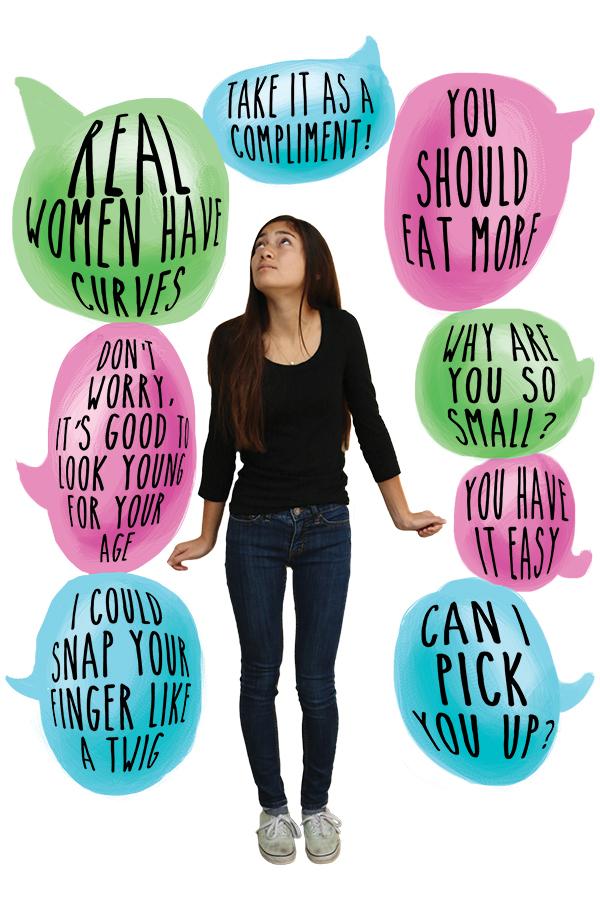Listen to the audio form of Esmé Ablaza’s perspective in addition to her conversation about skinny shaming with fellow Palo Alto High School junior Zoë Limbrick. This audio piece was originally published by Paly Radio on Dec. 10, 2014.
Photo illustration by Esmé Ablaza, Ana Sofía Amieva-Wang and Karina Chan
[soundcloud url=”https://api.soundcloud.com/tracks/181810351″ params=”auto_play=false&hide_related=false&show_comments=true&show_user=true&show_reposts=false&visual=true” width=”100%” height=”600″ iframe=”true” /]
Flash back to seventh grade. I step outside of my Spanish 1A classroom and into the packed hallway. I’m about to escape to lunch when all of a sudden I hear a high-pitched voice in a mock-Southern accent drawling behind me: “That skinny ass in them skinny jeans.” It takes a moment for me to register that the voice is referring to me. I turn around. An eighth grade boy looms over me, a smirk plastered across his acne-ridden face. I stand there for a second, my heart pounding, until I turn on my heel and walk away as fast as I can. I don’t wear skinny jeans for the rest of the week.
Right now, the body acceptance movement is all the rage. Celebrities, magazines, Tumblr pages and teenagers are spreading the message that girls should love themselves for who they are and not what size jeans they wear. At this point, everyone knows better than to call someone fat. I mean, who hasn’t read Jennifer Lawrence’s quote, “In Hollywood, I’m obese,” or heard Meghan Trainor’s hit “All About that Bass,” in which she strikes a blow for curvaceous women everywhere with her line, “I’m bringing booty back”?
But what about my (admittedly pint-sized) booty? It, along with the rear ends of countless other women (“fat” and “skinny” alike), is also far from the 21st century ideal of belonging to someone tall and slender but also curvy. Why am I not allowed to charge into the body-image war alongside my full-figured friends? I thought this whole thing was about everyone loving and accepting everyone else, but all of a sudden Nicki Minaj is screaming, “F— those skinny bitches,” and I’m paralyzed all over again with that same self-conscious fear I felt in the hallway back in seventh grade. What is a “skinny bitch” like me to do?
People know that it is wrong to body-shame larger women, but hardly anyone is aware of the condescending comments aimed at the people on the other side of the body-image spectrum: the “too-skinny-and-not-curvy-enough” or “boyish-looking” girls, otherwise known as another group of people who don’t measure up to society’s ideal. It is time for the world to understand that body shaming, no matter what type of body one is debasing, is unacceptable.
The “perfect” body is unattainable to most people, resulting in those with different shapes and sizes feeling inadequate. Despite this, smaller people’s insecurities are often invalidated. In the past, I have been encouraged to take other people’s comments about my body as a compliment.
In a Sept. 2014 article published by the Yale Herald, Rachel Baker claims that skinny-shaming is myth. According to her, “There are a series of societal benefits and advantages that come with being skinny.”
The main “societal benefits” cited include the “lack of character judgments” placed on skinny people due to their bodies and society’s assumptions that a skinny body type is “normal,” sexually attractive and healthy.
As a 5-foot-2-inch and lighter-than-average girl, I do not enjoy a single one of these “privileges” and the same goes for many other people with smaller body types. I receive incessant comments about my body from adults and my peers in addition to unwarranted questions about my weight and eating habits, which lead me to believe that others find my body type abnormal.
As for sexually desirable, are boys and men not pressured on the daily to find curvaceous, Beyoncé-esque women sexy? I beg anyone who has ever heard a boy say, “Damn, I’d tap that nonexistent ass,” to step forward.
Feeling unsure where to start when discussing the topic of sex appeal in relation to less “well-endowed” women, I consulted with my fellow svelte friend and Palo Alto High School junior Zoë Limbrick.
“For the longest time I was convinced no boy would ever like me unless he had a fetish for green beans,” Limbrick says.
Due to constant commentary on the bodies of smaller women and society’s definition of the ideal body, it is clear that skinny-shaming does exist. Besides, even if the privileges Baker mentions were enjoyed by every skinny person in the universe, how could we ever bring ourselves to condone the shaming of anyone, no matter their body type?
“When your friends and adults are always reminding you of how much smaller you are, you feel smaller in a very emotional space,” Limbrick says. “Like you don’t have the right to take up any space because you’re smaller.”
We need to take a step back and look at what we’re doing. We have created a culture where no one wins. If you are too big, you are ridiculed. If you are too small, you are expected to deal with constant negative comments aimed at your body. We must remember our original goal: to foster body acceptance of everyone, no matter their size, in order to end body shaming once and for all.





